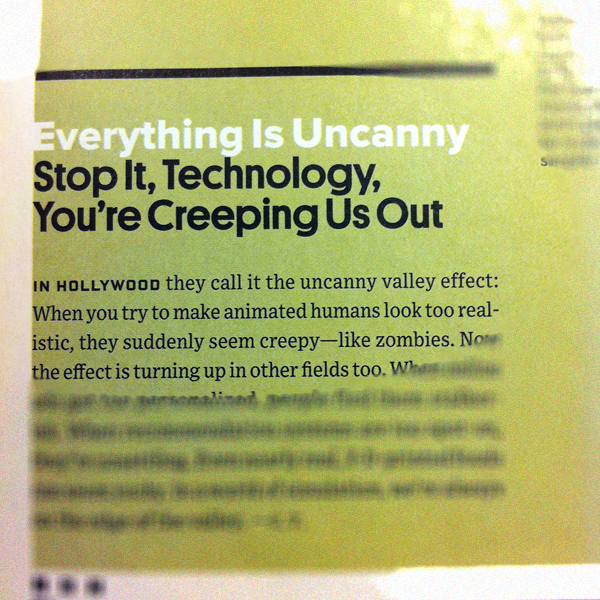
The latest print issue of Wired magazine (Sept 2015) includes a mini-feature story on “The New Cultural Literacy 2016,” which includes the above entry on the ubiquity of the uncanny valley in technological design. The phrase “Uncanny Valley” has indeed become so ubiquitous in discourse that it seems to be drummed up whenever anything is “creepy” or horrifying in gaming, robotics, automation and computer imaging. The concept of the “uncanny valley,” described briefly in the magazine by Clive Thompson, is that “when you make animated humans look too realistic, they suddenly seem creepy — like zombies.” He’s summarizing the well-known theory of Masahiro Mori, and though he frames it as something out of Hollywood (the most common example is the creepy representation of Tom Hanks’ character in The Polar Express) it is a concept that has its roots in android science. I have discussed the Uncanny Valley theory regularly on this blog.
This deceptively small recognition by Wired has all the feeling of a watershed moment to me — it is a conscious acknowledgment of the ubiquity of the catchphrase “the uncanny valley.” But it’s the headline of this news byte that I want to briefly talk about out: “Everything is Uncanny” and the subhead “Stop it technology, you’re creeping us out.” [Note that the website version of the article puts it differently: “Technology is Really Starting to Creep Us Out”]
Let’s start with the latter cry to tech (“Stop it…”), which is voicing something a lot of people have likely thought privately, while at the same time caging the response as cheeky or flirty or humorous. But what makes it effective, more than merely a clever cry for an end to the “creepiness,” is that the line is framed as if speaking to “technology,” as if AI, robots, computers could all, en masse, respond to the request. This is inherent to the uncanny in general: a sense of life where there is none, animation where there is the inanimate, the plastic or the dead, motion where there should be stillness (“stop it!”). This “living dead” or “conscious non-entity” conceit is not just the rhetorical “apostrophe” nor the stuff of literature and the movies or even robotics. When the market on Wall St. seems to move on its own accord, for instance, we say things like it is having a “Bull Run,” or that it is a “Bear Market” — in other words, that it is like an animal with its own conscious will, often a will that moves against human wishes and desires. Ergo, it is creepy: we are not in control of what we thought we were, and the world is no longer obedient to what we think of as “natural” law.
Thus, technology “creeps us out.” Out of what? “Out of our comfort zone,” is the general sense of it. A zone where we were ostensibly masters of our domain, prior to the uncanny experience.
Now, to the headline itself: EVERYTHING IS UNCANNY.
Note that it does not say “The Uncanny is Everywhere.” The uncanny is not a place, but rather a feeling of displacement. It is an affective response, like boredom or joy — a feeling of “creepiness” in response to a stimulus that is therefore called “uncanny.” This is precisely why “everything” (and “thing” is the perfect term) CAN be uncanny. Because anything can trigger the emotion that things are not as they should be — that familiar has been made strange (e.g. “unheimlich” — unhomelike). We can always nominalize an adjective and promote it to a higher significance than it might otherwise have, generalizing a personal feeling into a universal phenomenon.
But to creep is also move along the fringes of perception, to slowly sneak up on the paranoid mind, to quietly escalate in power and threat. Technology has become so ubiquitous that it is a part of “everything” — and has snuck up on us, escalating in a power that seems autonomous. So even if Artificial Intelligence has not taken over the world with a mind all its own in some kind of science-fictional dystopia, at the same time it is everywhere and omnipresent, as though someone other than us is responsible. Everything is uncanny.